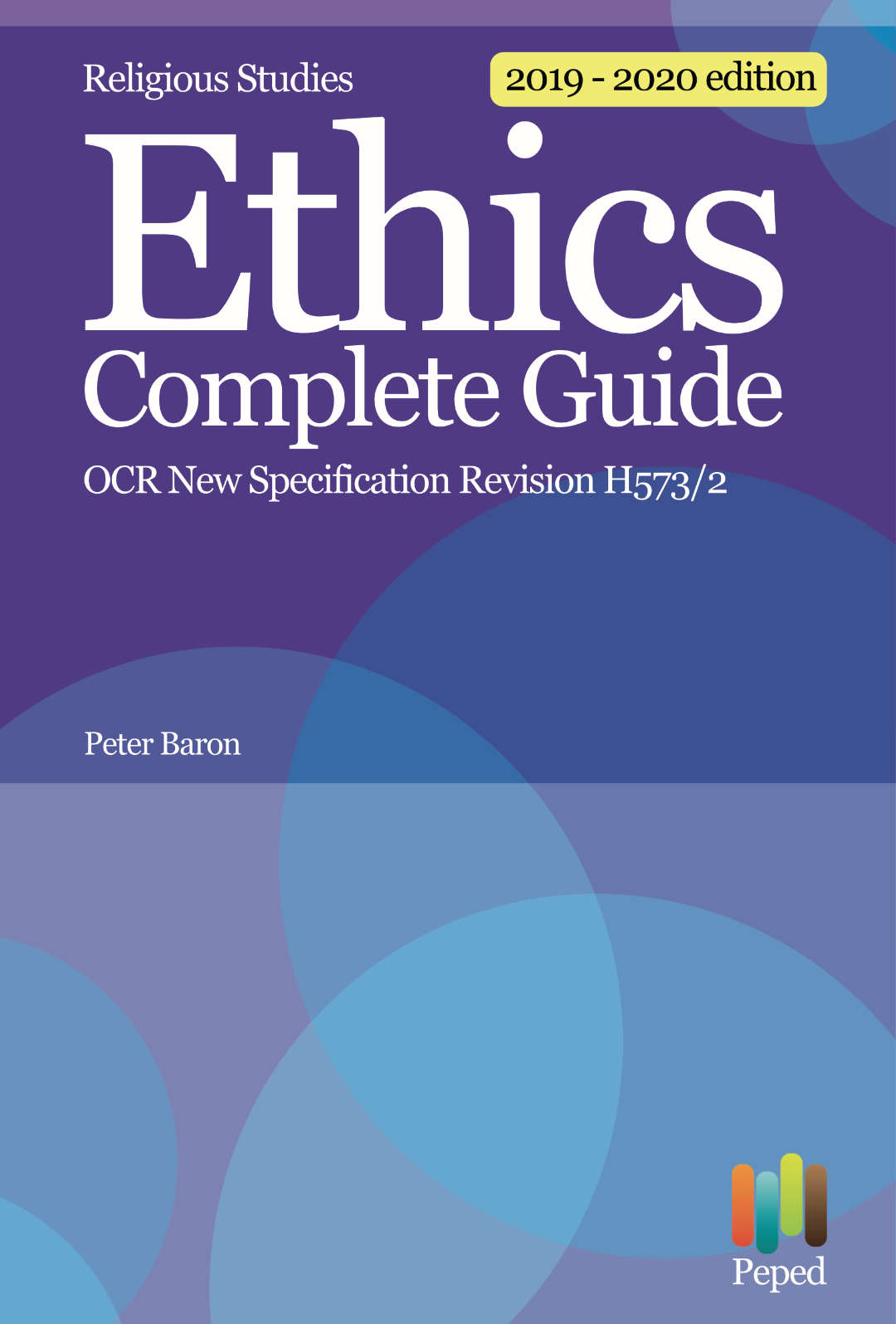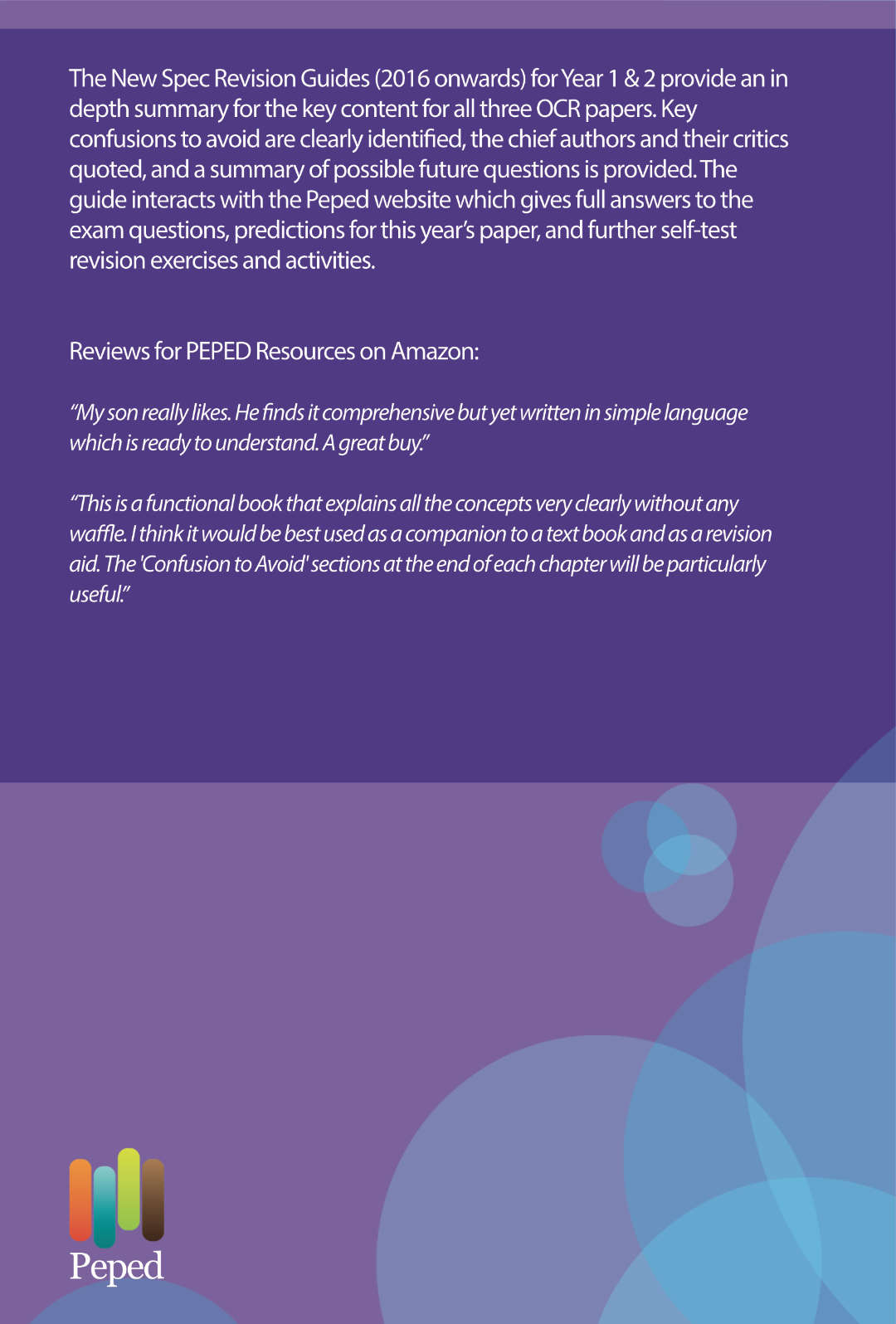Get all 3 complete guide titles for £18.99! Email sales@peped.org & request it.
Religious Studies Ethics Revision Complete Guide – New Edition (2020)
The New Spec Revision Guides (2016 onwards) for Year 1 & 2 provide an in depth summary for the key content for all three OCR papers. Key confusions to avoid are clearly identified, the chief authors and their critics quoted, and a summary of possible future questions is provided. The guide interacts with the Peped website which gives full answers to the exam questions, predictions for this year’s paper, and further self-test revision exercises and activities.
£9.99
Product details
Format: Softcover Book
Size: 5.5″ x 8.5″ (14 x 1.1 x 21.6 cm)
Paper: Black & White on White paper
Pages: 199
ISBN-13: 978-1976991769
For bulk orders over 30 items please contact sales@peped.org directly
Table of Contents 1
- The Examination
- How to Use this Guide
Structure
Analysis
Evaluation
Practise - Introduction to Ethics
Key Terms
Structure of Thought
Normative Ethics – Analysis
Meta-ethics
Applied Ethics
Deontological
Teleological
Four Questions to Ask of Ethical Theories
Key Quotes – Norms - Natural Law
Key Terms
Structure of Thought
Aquinas’ Argument – Analysis
Primary Precepts
The Four Laws
Secondary Precepts
Phronesis
Apparent Goods
Two Goods in Conflict
Evaluation – Strengths
Evaluation – Weaknesses
Confusions – Natural Law
Possible Exam Questions
Practise Exam Question
Key Quotes – Natural Law
Table of Contents 2
- Kantian Ethics
Background
Key Terms
Structure of thought
Analysis – Deontological
Autonomy
Good Will
Duty
Categorical Imperative (C.I.)
Summum Bonum
Three Postulates
Evaluation – Strengths
Evaluation – Weaknesses
Confusions – Kant
Possible Exam Questions
Practise Exam Question
Key Quotes – Kant - Bentham’s Act Utilitarianism
Background
Key Terms
Background
Structure of Thought
Analysis – Motivation
Hedonic Calculus
Quantitative Pleasure
Pleasure Machines
Evaluation – Strengths: Bentham
Evaluation – Weaknesses
Key Quotes – Bentham
Table of Contents 3
- Mill’s Rule Utilitarianism
Background
Key Terms
Analysis – Weak Rule Utilitarianism
Structure of Thought
Mill & Bentham
Mill on Happiness
Higher and Lower Pleasures
Rules
Justice
Act or Rule?
Evaluation – Strengths: Mill
Evaluation – Weaknesses: Mill
Confusions – Mill
Possible Exam Questions
Practise Exam Question
Key Quotes – Mill - Situation Ethics – Christian Relativism
Background
Introduction
Analysis – Origins in the New Testament
Four Working Principles
Six Fundamental Principles
Conscience
Evaluation – Strengths: Situation Ethics
Evaluation – Weaknesses: Situation Ethics
Confusions
Possible Exam Questions
Practise Exam Question
Key Quotes – Situation Ethics
Table of Contents 4
- Euthanasia
Background
Definitions
Active or Passive
Analysis – Legal Position
Sanctity of Life – Bible
Sanctity of Life – Ethical Theories
Quality of Life – Situation Ethics
Autonomy
Evaluation – Arguments Against Euthanasia
Possible Exam Questions
Practise Exam Question
Key Quotes - Business Ethics
Background
Key Terms
Analysis – Issues
Stake-holders
Codes – Kant’s Duty
Cost/Benefit
Externalities
Rights
Individuals
Evaluation – Future Generations
Globalisation
Possible Exam Questions
Practise Exam Question
Key Quotes
Table of Contents 5
- Ethics in Year 2 (Spec. sections 4-6)
Key Terms - The Ethics Toolkit Revisited
- Meta-Ethics
Background
Specification
Key Terms
Analysis – Cognitive or Non-Cognitive
Structure of Thought
The Naturalistic Fallacy
The Open Question
Moore’s Intuitionism
Evaluation of Intuitionism
Utilitarian Naturalists
Ayer’s Emotivism (“Expressivism”)
Evaluation – Ayer
Absolutism & Relativism
C.L. Stevenson’s Emotivism
R.M.Hare’s Prescriptivism
Evaluation – Prescriptivism
The Legacy of David Hume
Key Confusions to Avoid
Possible Future Questions
Practise Exam Question
Key Quotes – Meta-ethics
Suggested Reading
- Conscience
Issues
Specification
Analysis – The Psychology of Conscience: Freud
Background
Key Terms
Structure of Thought
Freudian Revolution
Ego
Id
Superego
Guilt
Oedipus Complex
Evaluating Freud
Weaknesses
Strengths
Key Quotes – Freud
Evaluation – Psychological Approaches
A Theology of Conscience – Aquinas
Key Terms
Analysis – Synderesis & Conscience
Structure of Thought
Vincible and Invincible Ignorance
Evaluation – Aquinas
Joseph Butler – Innate Conscience Guided by Reason
Evaluation – Butler
Authoritarian Conscience – Eric Fromm
The Humanistic Conscience
Key Confusions
Possible Future Exam Questions
Practise Exam Question
Key Quotes – Conscience
Suggested Reading
Table of Contents 6
- Sexual Ethics
Issues Surrounding Sexual Ethics
Structure of Thought
Analysis – Sex & Evolution
Kinsey & the Sexual Revolution
Christian Views on Sex
Catholic Teaching Today
Evaluation – Catholic View
Situation Ethics – Christian Relativism
Evaluation – Situation Ethics (Christian Relativism)
Homosexual Acts – a Test Case
Kant on Sex
Evaluation of Kant
Utilitarianism – Balancing the Positive and the Negative
Evaluation – Mill
Preference Utilitarianism
Key Confusions
Possible Future Exam Questions
Practise Exam Question
Key Quotes – Sexual Ethics
Suggested Reading - The Four Questions Answered
- The Night Before the Exam
Read every question and highlight key words
Sketch out your thesis/ key questions about the question
Be bold in your answer
Analyse, don’t just assert
Illustrate your argument
What is the examiner looking for?







